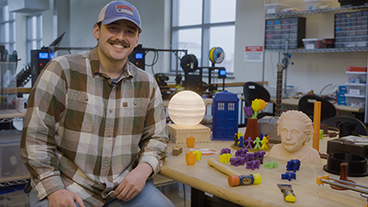
Contact Us
Physics Program
Physics: Engineering Technology Degree
Build a better tomorrow by learning innovation today.
Quick Look
OFFERED AS:
Major
FORMAT:
In-Person
CREDITS REQUIRED:
120
Become a master of technology with our B.S. in Engineering Technology degree from Kutztown University. This is one of the best engineering undergraduate programs in Pennsylvania to gain cutting edge, hands-on tech experience.
Our engineering technology major teaches you how to:
- Analyze data
- Build codes
- Design prototypes
- Use 3D printers, a CO2 laser cutter & CAD software
Earn an affordable 4-year degree that gives you lifelong engineering skills.
Why Choose KU for an Engineering Technology Degree
We believe that the key to career success starts with student empowerment. When you choose KU for a B.S. in Engineering Technology, we provide the following benefits:
- Professional support & guided learning
- Affordable tuition with financial aid options
- Beautiful campus & convenient location
- Welcoming environment & diverse student body
We also offer guaranteed admission to Reading Area Community College (RACC) students who have completed an AAS in Machine Tool Technology or AAS in Mechatronics. Click here for more details.
Engineering Technology Degree Highlights
Our engineering technology major fully prepares you for the tech world outside of the classroom. And here’s what makes this degree one of the best engineering undergraduate programs in Pennsylvania.
Program Highlights:
- Work one-on-one with professors in lab-based environments
- Learn Computer Aided Design software (CAD) to solve real world problems
- Work with St. Luke’s prototyping program in their Simulation Center
- Utilize cutting edge machine tool technology, including a C02 Laser Cutter, CNC Router, 3D printer, digital multimeter and more
- Conduct research in your final year or work as an intern in the field
Student Learning Outcomes
-
Physics (BS)
- Upon completion of the B.S. Physics program, students will be able to demonstrate fundamental knowledge in core areas of physics.
- Upon completion of the B.S. Physics program, students will be able to demonstrate experimental and computational skills required of a physicist in higher education or industry.
- Upon completion of the B.S. Physics program, students will be able to demonstrate effective scientific communication through oral, written, and visual mechanisms.
- Upon the completion of the B.S. Physics program, students will be able to demonstrate analytical and problem-solving skills.
The physics engineering technology program has been instrumental in shaping my career, providing me with both theoretical knowledge and practical skills. Through the program, I've gained hands-on experience and developed a problem-solving mindset that has greatly benefited my professional growth.
Marino Gomez ’22, Electro Mechanical Technician, Sumitomo (Shi) CryogenicsEngineering Technology Degree FAQ
-
What engineering technology jobs can I get with this degree?
You can choose a variety of innovative career paths with a B.S. in engineering technology. Below are possible job titles and average salaries according to the U.S. Bureau of Labor Statistics (2022).
- Mechanical Engineering Technician: $66,390
- Computer and Information Research Scientist: $136,620
- Software Engineer: $124,200
- Aerospace Engineering Technician: $74,410
- Machinist: $48,510
- Administrative Services and Facilities Manager: $101,870
- Computer Programmer: $97,800
-
What are the degree requirements for a B.S. in Engineering Technology?
Students can take a variety of exciting courses in this physics program. See what engineering technology classes we offer at Kutztown University here.
-
What is engineering vs. engineering technology major?
While our engineering major is more math-oriented, the engineering technology program has a more hands-on approach, with a strong emphasis on utilizing on campus laboratories.
-
Is an internship required for an engineering technology major?
It depends. You can either complete an internship or conduct research in the field before graduation.
-
What labs will I use throughout my engineering degree?
The benefits of pursuing a B.S. in Engineering Technology at Kutztown University is that you are guaranteed hands-on experience in multiple lab spaces.
Here are the cool spaces you will work in:
TAP (Tech + Prototyping Lab): 3D printing
The Technology & Prototyping (TAP) Lab in the department of Physical Sciences is an interdisciplinary design and fabrication space used across the department and the University in support of coursework, student & faculty research and general STEM outreach. The clean side of the lab includes a fleet of 3D printers with over 10 miles of filament used and roughly 16,000 hrs of print time. Students have access to Arduino’s, Raspberry Pi’s and a wide variety of electronic and robotic components.
Dirty Lab: CO2 Laser Cutter + CNC router
This companion space in the Technology & Prototyping Lab handles the “dirty” side of fabrication. The space houses a 90 W CO2 laser cutter for engraving and cutting, paper, cardboard, woods and plastic. The laser cutter is complimented by a CNC mill for cutting plastic, wood and soft metals. The space also includes hand and power tools for project fabrication.
Laser Lab
The Nanoscale Thermal Sciences Lab (NTSL) studies heat transfer and thermophysical properties at a scale 100-1,000 times smaller than a hair. The lab uses a custom-built Frequency Domain Thermoreflectance system measure thermal properties and an Atomic Force microscope to measure nanoscale surface features.
Research Lab
In the Advanced Physics lab, students test the principles that they previously applied in their theoretical courses. Working at individualized workstations, students measure properties such as the speed of light, the charge on an electron and the emission of a Black Body.
Classroom Lab
The Electronics, Optics and Instrumentation lab space give students industry standard equipment to learn hands-on marketable skills that are required by industry. Each workstation provides students with access to over 1,500 electronic, optical and sensor components along with computer interfaced power and diagnostic tools.






